- Home
- Robert Harris
The Second Sleep Page 12
The Second Sleep Read online
Page 12
‘God damn this road!’ muttered Hancock. He was staring straight ahead, concentrating on steering around the potholes. But although he handled the buggy with skill, it was impossible to avoid them all and several times the wheels jolted so hard Fairfax was almost pitched over the side. ‘How often have I offered to fix it for her, and always she refuses!’
They clattered between the gateposts into the narrow lane and began to descend the hill. Hancock said through clenched teeth, ‘Doubtless it’s too much to hope ye might tell me the true reason for your visit to Lady Durston this afternoon.’
‘So we are back to this? I have said what happened.’
‘Aye, what happened, but not the truth that lies behind it. No one walks all the way out here without a purpose. Ye delayed going back to Exeter in order to see her.’
‘Not at all.’
‘Lie then, it does not concern me.’ He took up his whip and flicked the horse’s flanks. The buggy gained speed and Fairfax had to clutch on to his hat to prevent it flying away. It occurred to him that Hancock was slightly drunk. ‘I’ve admired her ladyship for many years,’ the captain went on, ‘many, many years – since before her husband died, to tell the truth – so I well understand her attraction.’
‘No such thought has entered my head, sir, I assure you. This is foolish talk.’
For the first time Hancock took his eyes off the road to look at Fairfax. ‘Then why were ye there? And in the house together, if I’m not mistaken, because I swear I glimpsed her through the window as I came along the drive.’
‘I’ll answer no more questions, and would be obliged to be set down here. I would prefer to walk the rest of the way.’
‘No, no, I’m a man of my word. I promised her I’d see ye home, and so I shall. She seems quite unreasonably convinced some mortal danger lies concealed in these harmless empty lanes.’ He darted another look at Fairfax. ‘And again I ask myself: why is that?’
They had reached the bottom of the hill. The forge was shuttered, although there was a light in an upstairs window, presumably Gann’s home. The yellow plastic shell at the top of its pole gleamed faintly luminous in the twilight. They turned towards the village.
Hancock slowed the buggy and said casually, ‘Well, none of it matters. What’s past is past. Ye may congratulate me, Fairfax.’
‘Congratulate you on what?’
‘Just now, when we were alone, I asked Sarah – Lady Durston – if she’d do me the honour of becoming my wife, and she accepted.’
Fairfax stared at him. For a moment he was too surprised to speak. ‘Well, then yes, of course, I do congratulate you, most sincerely.’
‘It’s not the first time I have asked her.’
‘No?’
‘Oh, she does not love me – I do not deceive myself on that. But she needs a man to protect her and restore her fortunes, and I have hopes that in time her feelings for me may grow.’
Fairfax could not stop himself asking, ‘Did she say why she had changed her mind?’
‘She did not. But in some curious sense I cannot fathom, I attribute it to ye.’
‘Surely not!’
‘I do. That’s why I’m interested to know what passed between ye. But as ye clearly have no intention of telling me, I suppose I must concentrate on my good fortune and forget about the rest.’
There was no one abroad in the village. It was just as it had been on the night Fairfax arrived, which seemed to him at that moment a very long time ago – the quiet muddy road, the drawn curtains, the occasional lamp, the engulfing silence. Hancock drew up outside the parsonage, applied the brake, then reached into his inside pocket and drew out what looked to be the same folded sheet of paper he had produced at supper. ‘This is our application for a wedding licence, signed by us both this evening. I believe notice of it must be read out in church before the ceremony can be held.’
‘That’s true – on three successive Sundays.’ How typical of a man of business, thought Fairfax with sudden bitterness, to make sure he had the deal in writing and signed before the other party could change their mind!
‘I thought ye might make the first announcement from the pulpit this Sunday – before departing.’
‘Yes, it would be an honour. Congratulations again.’
‘Good night, Father.’
‘Good night, Captain Hancock.’
There was no handshake. Fairfax descended from the buggy. Hancock released the brake, jerked the reins, said, ‘Walk on!’ and trundled away up the lane that ran next to the parsonage, leaving the priest alone on the roadside, holding the paper and watching him until he disappeared.
CHAPTER TWELVE
The Devil’s Chair
THE MOMENT HE walked through the door, Agnes came hurrying from the kitchen, Rose almost treading on her heels. ‘Father Fairfax! Thanks be to God!’
He made an effort to put on a show of apology, smiling, taking off his hat, spreading his hands. ‘I am sorry to return so late, Mrs Budd – good evening, Rose – Lady Durston pressed me to stay for supper.’
‘But I’ve been worried sick, sir! It’s but a week to this very hour since Father Lacy was carried home.’
‘Is it?’ He hung his head. ‘I had quite forgotten. How thoughtless of me. I apologise.’
‘Well, ye’re safe, at least, and that’s the main thing.’ The irritation in her voice softened to relief. ‘So ye’ll not be wanting feeding, then?’
‘Thanks all the same, but no. The day has been long. A candle is all I require, and then I’ll bid you both goodnight.’
In the old priest’s bedroom, he sat on the edge of the bed to take off his boots, abandoned the effort, flopped back on the mattress and closed his eyes. He was affected by the fate to which Sarah Durston had just consigned herself – more affected than he would have expected, or cared to admit. He could not rid himself of the feeling that he was in some sense to blame – that if he had not embroiled her in the matter of Morgenstern’s letter, she would have continued to resist Hancock’s proposal, but that now, thanks to him, she felt in greater need of a protector. He recalled the pressure of her hand as she said goodbye. Don’t think too badly of me. At the time he had read little into it, assuming she was merely referring to their argument in the library, but now he wondered if she was instead preparing him for the news that Hancock had taken such relish in delivering.
He turned it over and over in his mind until gradually the clarity of the day’s memories began to blur, and he fell asleep to the image of her white shirt leading him through the darkness into the interior of the shipwrecked mansion.
He woke from his first sleep with a start a few hours later. He lay there for a few moments, listening for signs of movement. Neither Mrs Budd nor Rose seemed to be stirring. He sat up and finished the task of removing his boots, then collected his candle, went over to the door and opened it quietly. No sound came from the other bedroom. On tiptoe he descended the stairs and let himself into the study. The registers were where he had left them, beneath the couch. He pulled out the volume covering the century before the Apocalypse, unwrapped it from its plastic cover, laid it on the desk, placed the candle next to it and turned to the page that recorded the marriage of Miss Julia Morgenstern.
According to Sarah Durston, no one knew that the old priest had been to see her apart from him. If this page was excised and destroyed, the only physical link between Durston Court and Lacy’s death would disappear. He could still inform the bishop of everything else that was suspicious. The circumstances of the priest’s demise might yet be investigated. But she would be left out of it and would be able, if she wished, to extricate herself from her promise to marry Hancock.
He rummaged through the desk drawer until he found the parson’s penknife, opened it and tested the blade against his thumb. As he would have expected of that avid collector, it was honed like a razor. He placed the tip at the top of the page, and pressed it close to the binding. He increased the pressure. The first few fibres of t
he thick paper began to separate. But then he stopped and lifted the blade away. He could not do it. It would be a sin against history. The strength of his conviction shocked him. As surely as a man might catch the sweating fever, he thought, I have been infected with the heresy of antiquarianism. He bowed his head and prayed to God to guide him to the light.
He closed the knife and replaced it in the drawer beside the bundle of sermons tied with black ribbon. Suddenly curious, he lifted them out, unfastened the knot and started sorting through them – two dozen at least, on brittle yellowish quarto-sized paper. The ink was faded and hard to read, full of crossings-out and added passages. In places the force of the nib had torn the paper. Arrows streaked across the pages to link to new material. Sentences in minuscule writing looped around the edges.
He rotated the pages and tried to decipher the tiny script. And in those days shall men seek death, and shall not find it; and shall desire to die, and death shall flee from them. He recognised the verse from the Book of Revelation. In fact, as he worked his way through the papers, he saw that all the sermons were based on Revelation. They appeared to have been revised endlessly over the years and presumably delivered on more than one occasion. What was it that somebody had remarked at the burial? His sermons were of a peculiar sort …
He retied the bundle and pushed it back in the drawer. Then he took the candle over to the bookshelves and stood before the forbidden texts. His gaze travelled along the spines until it came to rest on Antiquis Anglia by Dr Nicholas Shadwell.
He reached out and withdrew the heavy volume, carried it over to the desk, sat, and opened it to the title page.
Antiquis Anglia
A Record of Miscellaneous Surviving Structures
From the Late Pre-Apocalypse Era
by
Dr Nicholas Shadwell, SA
With Illustrations and Maps
by
Mr Oliver Quycke, SA
First Published by the Society of Antiquaries
London MCDXLIX
The frontispiece was an etching of a towering concave structure, with trees and people drawn in for scale, and a caption: The Great Chimney, Gainsborough, Lincs.
He turned the page to Shadwell’s Preface.
I have been inclined since my earliest years to a fascination for antiquities, and being born with some limited private means, and never having encumbered myself with the delights of a wife and family, I have been able to indulge my passion to a degree that perhaps no other man in England can boast. Mine has not been an entirely solitary life, I am glad to say. Throughout my travels, which have taken me the length and breadth of the country, I have been fortunate in the companionship of my secretary, Oliver Quycke, Esq., whose skill in draughtsmanship is evident in these pages.
I have not attempted to give a comprehensive account of every building and monument in England above eight hundred years old, for such a task would be impossible. Too numerous to count are the examples that have survived from the Pre-Apocalypse Era, most notably our churches and cathedrals, which, being constructed of stone, have proved more durable than structures erected many generations later. The same may be said of certain houses and other public buildings of what the ancients called their eighteenth and nineteenth centuries – now some thousand years old. There are even structures dating from far earlier times, such as the great Roman wall between England and Scotland, part of which once again serves as our fortified border against that ferociously independent northern people, even though it originated some 2,700 years ago. Stone – at least certain types of stone, such as granite, limestone and marble – is impervious to the ages.
However, the latter part of the twentieth century and the first quarter of the twenty-first present a very different picture. Paradoxically, what was supposedly the ultimate and most advanced phase of scientific technology has left almost nothing behind except plastic and fragments of glass. Who can now believe that at one time London alone is said to have boasted a dozen buildings rising to a height of more than six hundred feet, and one that rose to a thousand? No trace of them remains.
We do not know the precise processes by which these structures were destroyed so completely and so quickly. Some have proposed the theory of a terrible war involving explosives of unimaginable power. On the other hand, my colleague Mr Berkeley has speculated that it may have been due to the late-ancient era’s reliance on the use of embedded steel in concrete: once the preponderance of glass that encased these structures was damaged (they must have been quickly abandoned by their inhabitants), rainwater was able to enter them. A combination of vegetative growth in summer and cracking caused by ice in winter in due course penetrated the concrete and caused the steel to rust. The rusted steel, in turn, expanded to fracture the concrete further, and the buildings eventually collapsed. This theory strikes me as the most plausible. What is sure is that within 150 years, when human beings began once again to record the world around them, only a few shattered mounds of debris remained, and even these have now entirely disappeared. (It may be noted in passing that sailors returning from long voyages in the West Indies have reported an area of ancient plastic flotsam, miles across, which not even eight centuries of Caribbean tempests have been able to disperse – the sinkhole down which an entire civilisation may be said to have vanished.)
The same is true of almost every structure of that period – apartment buildings, houses, ‘shopping centres’, factories, bridges, aeroplane ports … When we survey the tranquil moors and plains, the fields and farmland, the woods and forests of England, it is impossible for the imagination to conceive that they once teemed with buildings. And it is not merely buildings that have vanished. Maps exist showing a great system of wide roads and steel-tracked causeways carrying locomotive engines that has been crumbled to nothing by the remorseless forces of nature, and whose very outlines are lost under many feet of roots and soil.
Not all is destroyed, however. Some edifices, for the most part constructed of concrete but without glass, have proved too large or too durable to be completely effaced, and it is these I have made it a large part of my life’s work to catalogue, and which are the subject of this volume. They appear, for the most part, to be either the concrete supports of road bridges, the embankments of the same, or various chimneys and towers. What was their function? Of what mighty and intricate systems were they once a part? These questions we cannot answer. They stand strewn across the landscape – isolated, melancholy, mute – the tombstones and funerary monuments of a once-thriving civilisation of unimaginable sophistication that was felled with terrible and mysterious suddenness nearly a millennium ago.
The volume ran to almost three hundred pages. Fairfax turned them slowly. It was essentially a picture book. Each page consisted of an illustration of a structure, captioned with a few archaeological details and accompanied by a sketch map giving its location. Some sites were small, such as ‘The Pillars at Boxley’, showing six round concrete columns rising weirdly out of a field in Kent. ‘The Arc, Huddersfield’ was a delicate rainbow-like ellipse set against a background of wild moorland. ‘The South Wonston Water Tower’ was shaped like a torch-holder planted in the ground. Others were not really structures at all, such as ‘The Stokenchurch Gorge’, a vast, curving man-made canyon carved out of the Chiltern Hills. Perhaps the most dramatic was ‘The Charwelton Tower’, soaring needle-thin from a flat deserted plain with not a road in sight, and visible, according to Shadwell, a full day’s ride away. The margins were covered in tiny scribbled notations, made in pencil, hard to decipher. The drawings themselves were precisely rendered. He turned the book to the candle to study them more closely.
What a labour it must have been, Fairfax thought, to scour the country and record all this. The book was a monument in itself. He had often passed similar ruins, albeit smaller and less complete: a megalith standing isolated by a roadside near Exeter without explanation; a lump of concrete half hidden by trees in the king’s hunting woods around Yarcombe. He had nev
er troubled himself to consider where they came from. They were merely a part of the English landscape. Once the mind began to worry away at their meaning, he could see how easily one might become obsessed. There were in truth two Englands: the everyday one, and this other, ancient hidden England, almost obliterated, through which most people moved without thinking.
He leafed to the index to see if any of the sites he knew had merited an entry. The structures were listed alphabetically by region. Wessex was particularly well served. He ran his finger down the place names and stopped when he came to ‘The Devil’s Chair, near Addicott St George’.
He stared at it for a few moments, then flicked back to the relevant page. Mr Quycke’s illustration showed a featureless concrete cylinder surrounded by trees, not as impressive as some of the other entries, but formidable nonetheless.
The Devil’s Chair rises to a height of some seventy feet with a circumference of eighteen. If the trees that have encroached upon it in the past century were to be cleared, it would command extensive views to the east. The most plausible theory of its purpose, viz. that it might have served as an observation tower, is frustrated by the fact that there appears to be no discernible entrance, although rust marks rising at regular intervals along the NW elevation to the top indicate the possible existence in the past of a metal ladder. Local inhabitants are unclear whether the name refers to the structure itself or the ground upon which it stands, a depression girdled by steep hills, which does to some extent resemble a chair.
After he had made a copy of the map, sketching out the route from the village to the hill, Fairfax became aware of the sounds of movement above him. He did not wish to encounter Mrs Budd and explain what he was doing. Besides, there was nothing more he could do of any use except gather his strength for the next day. When he returned to bed, however, he found himself in that frustrating mental state in which one is too exhausted to think productively and yet too alert to sleep, and in this restless borderland he lay for the remainder of the night, twisting and turning between the old priest’s sheets, until he heard a cock crow in the village. Soon afterwards, some time before six o’clock, the first faint greyness appeared at the window. He drew back the curtains and gazed upon a view as monochrome as one of Mr Quycke’s etchings. Nobody else seemed to be up.

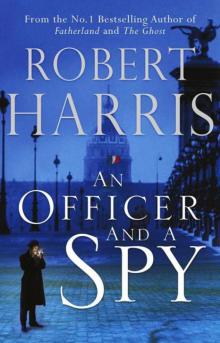 An Officer and a Spy
An Officer and a Spy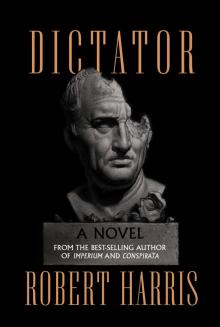 Dictator
Dictator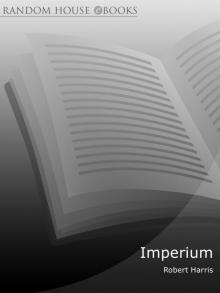 Imperium:
Imperium: Enigma
Enigma Fatherland
Fatherland Dictator:
Dictator: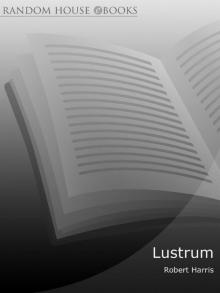 Lustrum
Lustrum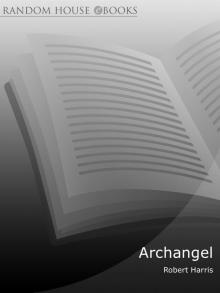 Archangel
Archangel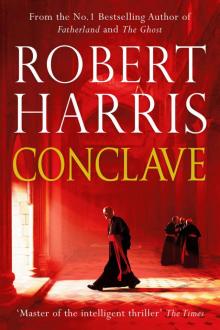 Conclave
Conclave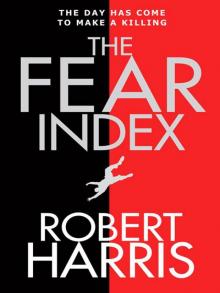 The Fear Index
The Fear Index The Second Sleep
The Second Sleep V2
V2 Lustrum c-2
Lustrum c-2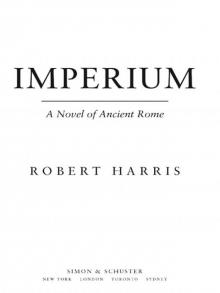 Imperium
Imperium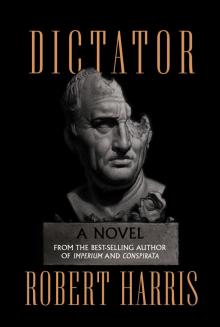 The Dictator
The Dictator Selling Hitler
Selling Hitler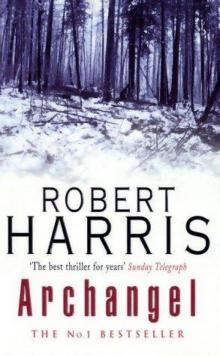 Archangel (Mass Market Paperback)
Archangel (Mass Market Paperback)